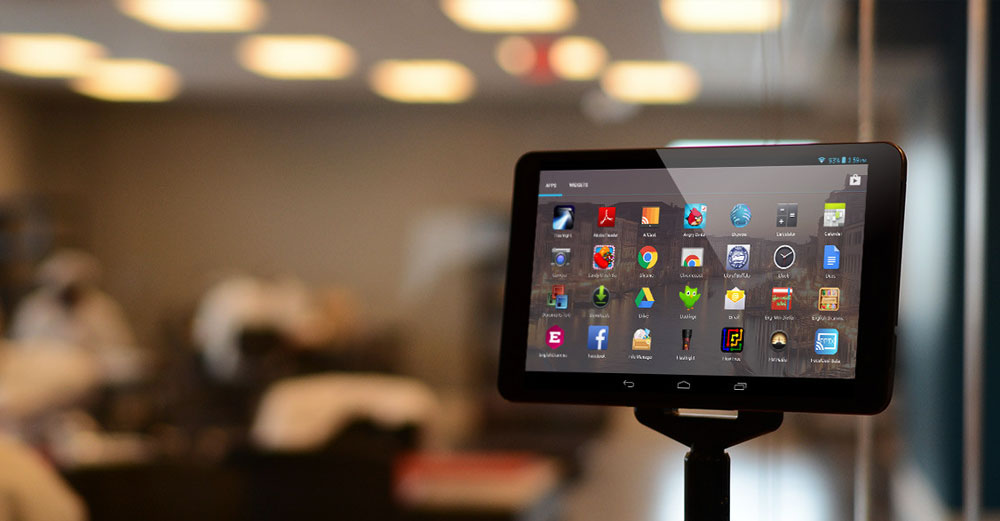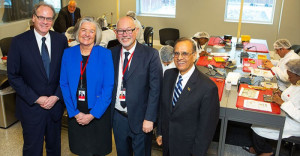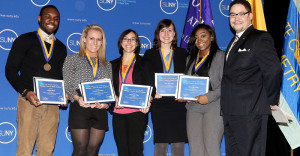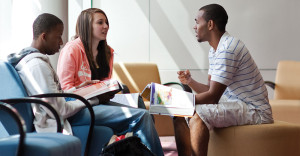
Ulla and JP Bak are fighting Third World illiteracy, and they’re doing it from Buffalo, New York.
In collaboration with the University at Buffalo through START-UP NY, the Baks recently opened their new manufacturing company, Bak USA, on the top floor of the Compass East building on Michigan Ave. In their clean room—which purportedly has the best views of the city—Bak USA’s operators build innovative, low-cost tablets equipped with educational software for distribution to children in underserved communities. “For a fraction of the price of schoolbooks,” says Ulla Bak, “kids will get access to a traditional curriculum, including reading, biology, and geography.”
In the two months since its grand opening in January 2015, Bak USA has already manufactured 3,000 tablets in-house, a portion of which has been sent to Kenya through its network of distributors. As production increases and the company grows (they currently have 20 employees, and they anticipate having 60 employees by November 2015, with a projected 250 employees in five years), the tablets will be shipped throughout Africa, South America…and Buffalo itself, where the burgeoning immigrant and refugee population, while well educated, may need support in brushing up on language skills.
University at Buffalo PhD graduate Bilel Neji will be heading R&D in the company’s new lab, investigating improvements to the tablet’s sensor and microprocessors. Two UB students—one in computer science engineering and one in biomedical engineering—are currently completing three-month rotating internships under his direction. Moving forward, the Baks hope to develop new software that will also allow the tablet to function as an interface between hospitals and patients, reducing hospital visits and, thereby, healthcare costs. For UB, that means additional internship opportunities for students in other departments, such as the life sciences.
In the meantime, Bak USA’s third current intern—a marketing student—worked out a deal with the UB Student Association, whereby UB students will get a 30 percent discount on the tablet. Students can load their coursework and e-books, then highlight passages and important facts using the tablet’s stylus. They can also use the tablets to access UB-centered apps (UB Learns, Buffalo Bulls Front Row, MY UB and UBMobile) and their student email. The tablet also serves as an unlocked phone and, needless to say, as a personal entertainment hub for surfing the Web, YouTube, and social media.
As much as they focus on the students at the receiving end of their tablets, the Baks focus even more on the people building them. Bak USA was fashioned after a company JP and Ulla established in Port-au-Prince, Haiti, after it was devastated by an earthquake in 2010. Says JP, “We realized that if we wanted to make a big difference in Haiti, we had to do something sustainable,” so they developed a business plan to reinvigorate the community by offering local residents professional training and well-paid jobs building 7-inch WIFI tablets.
Sustainable Job Creation
Bak USA was started with a goal similar to the Haitain company: reinvigorating Buffalo by employing residents who might have difficulty finding jobs elsewhere. Of their twenty employees, more than half are resettled refugees, many with PhDs from abroad. “When you come to America as a refugee, it’s difficult to get a job regardless of how well educated you are. Some of our employees look at Bak USA as a stepping stone. If they want to go somewhere after their six-month training period, we issue a certificate of accomplishment so they can prove to other companies that they have a certain skill set they didn’t have when they came.” Each tablet is assembled by hand, by one operator from start to finish, so that skill set is impressive—Bak USA operators gain not only pride of ownership but also a thorough familiarity with each component and its function within tablet construction overall.

Hiring refugees is just one aspect of a new movement called social entrepreneurship, in which business entrepreneurs act as agents for social change, allowing communities to reach their full potential by creating new opportunities for the marginalized and disadvantaged. But JP Bak, in particular, looks beyond providing Buffalo with jobs; he wants to help revolutionize the way business is done in the US by injecting it with the spirit of social entrepreneurship. “When you focus on issues other than profit, your company becomes more successful. It’s a trend in the world right now, and the younger you are, the more interested you are in this particular way of doing business,” JP asserts.
That conviction made UB the perfect place for implementing his ambitious plan. Together with UB’s Center for Entrepreneurial Leadership and School of Engineering and Applied Sciences, the Baks are coordinating a competition in which UB students will explore how tablets can be used in the underdeveloped world in the most efficient way, particularly in educational and small-business settings. “Overall, we want it to be under the umbrella of being a social entrepreneurship exercise,” says JP. “That means it’s not only a profit thing, it’s also about asking, How can we accommodate people who can’t afford a tablet? How can we create a good working environment in the factory? and so forth. We have several bottom lines we want them to focus on.”
Students will participate as members of a three-person, interdisciplinary team, competing for an internship and cash prize. Chris Janson, business development executive at UB’s Center of Excellence in Materials Informatics, likens the Baks’ competition to the Henry A. Panasci Jr. Technology Entrepreneurship Competition created by the UB School of Management and the UB Office of Science, Technology Transfer and Economic Outreach. “This is something of keen interest within the UB community here, and it’s exciting from a regional perspective as well,” he enthuses.
In order to qualify for the START-UP NY program, a company must align with a sponsoring university’s academic mission. In that regard, the relationship between Bak USA and the University at Buffalo is proving to be especially profound and mutually beneficial. Karen Utz, Director of Program Administration at UB’s Office of Economic Development, says, “When the Baks were applying for START-UP NY, we talked about introducing the concept of social entrepreneurship by offering a course on the subject. Influencing the curriculum will be an important part of the area of alignment between Bak USA and the University at Buffalo.” JP is also planning to work with the Center for Entrepreneurial Leadership at UB’s School of Management to bring in guest lecturers. “Social entrepreneurship is a very popular issue and has been discussed in many settings, but you don’t see it that often in practice, and if you see it in practice, you don’t see it in the United States. Now the students at UB will be sitting in the front row seeing exactly how this kind of animal plays out.”
There is perhaps an even more important way in which Bak USA aligns with UB’s academic mission: diversity. “The University at Buffalo welcomes students from all over the world, and our 20 employees represent thirteen different nations,” says Ulla Bak. “It’s very interesting watching UB’s interns and our employees, many of whom were PhDs in their own countries, interact. We’re learning a lot just from watching them.”
Goethe famously wrote, “All that is necessary for the triumph of evil is for good men to do nothing.” Ulla and JP Bak are proving that the converse is also true. As the men and women of Bak USA, University at Buffalo, and the Buffalo community join forces to align American business practices with people rather than profits, the whole world benefits, squarely putting triumph back in the hands of the good.



